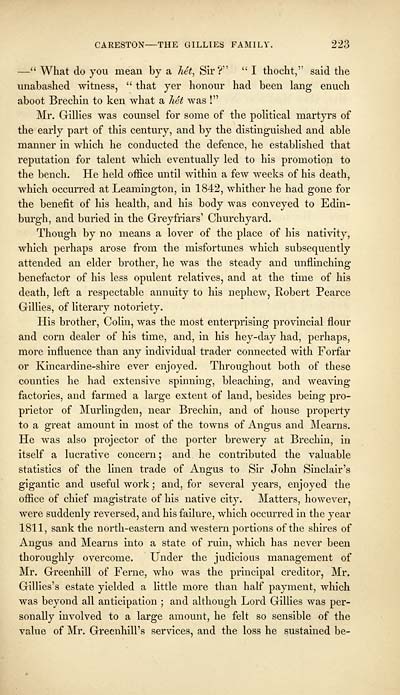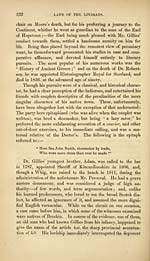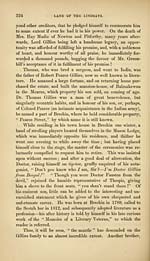Download files
Complete book:
Individual page:
Thumbnail gallery: Grid view | List view

CAEESTON — THE GILLIES FAMILY. 223
— " What do you mean by a het, Sir?" " I thocht," said the
unabashed witness, " that yer honour had been lang enuch
aboot Brechin to ken what a het was !"
Mr. Gillies was counsel for some of the political martyrs of
the early part of this century, and by the distinguished and able
manner in which he conducted the defence, he established that
reputation for talent which eventually led to his promotion to
the bench. He held office until within a few weeks of his death,
which occurred at Leamington, in 1842, whither he had gone for
the benefit of his health, and his body was conveyed to Edin-
burgh, and buried in the Greyfriars' Churchyard.
Though by no means a lover of the place of his nativity,
which perhaps arose from the misfortunes which subsequently
attended an elder brother, he was the steady and unflinching
benefactor of his less opulent relatives, and at the time of his
death, left a respectable annuity to his nephew, Robert Pearce
Gillies, of literary notoriety.
His brother, Colin, was the most enterprising provincial flour
and corn dealer of his time, and, in his hey-day had, perhaps,
more influence than any individual trader connected with Forfar
or Kincardine-shire ever enjoyed. Throughout both of these
counties he had extensive spinning, bleaching, and weaving
factories, and farmed a large extent of land, besides being pro-
prietor of Murlingden, near Brechin, and of house property
to a great amount in most of the towns of Angus and Mearns.
He was also projector of the porter brewery at Brechin, in
itself a lucrative concern ; and he contributed the valuable
statistics of the linen trade of Angus to Sir John Sinclair's
gigantic and useful work ; and, for several years, enjoyed the
office of chief magistrate of his native city. Matters, however,
were suddenly reversed, and his failure, which occurred in the year
1811, sank the north-eastern and western portions of the shires of
Angus and Mearns into a state of ruin, which has never been
thoroughly overcome. Under the judicious management of
Mr. Greenhill of Feme, who was the principal creditor, Mr.
Gillies's estate yielded a little more than half payment, which
was beyond all anticipation ; and although Lord Gillies was per-
sonally involved to a large amount, he felt so sensible of the
value of Mr. Greenhill's services, and the loss he sustained be-
— " What do you mean by a het, Sir?" " I thocht," said the
unabashed witness, " that yer honour had been lang enuch
aboot Brechin to ken what a het was !"
Mr. Gillies was counsel for some of the political martyrs of
the early part of this century, and by the distinguished and able
manner in which he conducted the defence, he established that
reputation for talent which eventually led to his promotion to
the bench. He held office until within a few weeks of his death,
which occurred at Leamington, in 1842, whither he had gone for
the benefit of his health, and his body was conveyed to Edin-
burgh, and buried in the Greyfriars' Churchyard.
Though by no means a lover of the place of his nativity,
which perhaps arose from the misfortunes which subsequently
attended an elder brother, he was the steady and unflinching
benefactor of his less opulent relatives, and at the time of his
death, left a respectable annuity to his nephew, Robert Pearce
Gillies, of literary notoriety.
His brother, Colin, was the most enterprising provincial flour
and corn dealer of his time, and, in his hey-day had, perhaps,
more influence than any individual trader connected with Forfar
or Kincardine-shire ever enjoyed. Throughout both of these
counties he had extensive spinning, bleaching, and weaving
factories, and farmed a large extent of land, besides being pro-
prietor of Murlingden, near Brechin, and of house property
to a great amount in most of the towns of Angus and Mearns.
He was also projector of the porter brewery at Brechin, in
itself a lucrative concern ; and he contributed the valuable
statistics of the linen trade of Angus to Sir John Sinclair's
gigantic and useful work ; and, for several years, enjoyed the
office of chief magistrate of his native city. Matters, however,
were suddenly reversed, and his failure, which occurred in the year
1811, sank the north-eastern and western portions of the shires of
Angus and Mearns into a state of ruin, which has never been
thoroughly overcome. Under the judicious management of
Mr. Greenhill of Feme, who was the principal creditor, Mr.
Gillies's estate yielded a little more than half payment, which
was beyond all anticipation ; and although Lord Gillies was per-
sonally involved to a large amount, he felt so sensible of the
value of Mr. Greenhill's services, and the loss he sustained be-
Set display mode to:
![]() Universal Viewer |
Universal Viewer | ![]() Mirador |
Large image | Transcription
Mirador |
Large image | Transcription
Images and transcriptions on this page, including medium image downloads, may be used under the Creative Commons Attribution 4.0 International Licence unless otherwise stated. ![]()
| Histories of Scottish families > History and traditions of the land of the Lindsays in Angus and Mearns > (241) Page 223 |
|---|
| Permanent URL | https://digital.nls.uk/94871918 |
|---|
| Description | A selection of almost 400 printed items relating to the history of Scottish families, mostly dating from the 19th and early 20th centuries. Includes memoirs, genealogies and clan histories, with a few produced by emigrant families. The earliest family history goes back to AD 916. |
|---|

